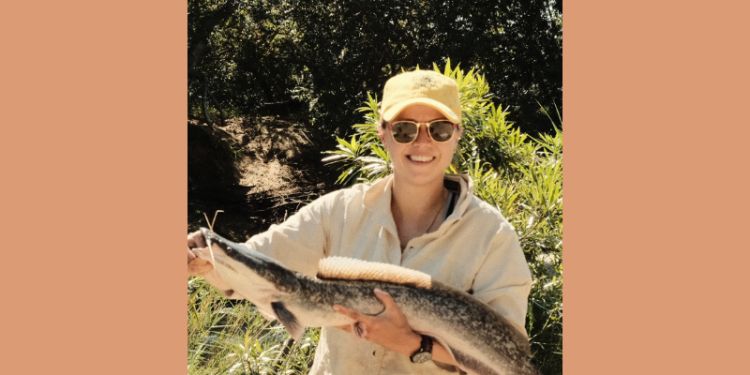World Food Day Spotlight: Dr Josie South

Find out about Dr Josie South's research on invasive fish species, climate change and sustainable fisheries.
Dr Josie South is an Associate Professor and Future Leaders Fellow in the School of Biology.
Through international and interdisciplinary collaborations and community-led research, one of Dr South’s research projects focuses on invasive species and inland fisheries, which are often overlooked components of global food systems. Dr South aims to challenges assumptions about aquaculture and advocates for food futures that are both ecologically sound and socially equitable.
What are the main drivers behind your research?
The driver behind my research is to understand how biological invasions interact with food security, both positively and negatively, to develop better policy for humans and nature.
What are you working on at the moment?
One of my key projects explores the impact of non-native fish species introduced through aquaculture. We’re focusing on a really important question: do these species help alleviate nutritional poverty, or could they actually make it worse?
The project investigates whether farming non-native fish might unintentionally harm vulnerable communities. For example, these species may compete with native fish for food, potentially reducing the nutritional value of individual fish. Changes in fish populations caused by biological invasions could also alter the overall nutrient profile available in local fisheries.
Beyond nutrition, there are also economic implications. Some non-native species may be sold at lower prices, while higher-value native species may become harder to catch. These shifts may reduce the economic benefits of fishing and limit access to nutritious food for certain groups.
By studying these dynamics, we aim to provide evidence-based guidance on whether expanding non-native aquaculture is beneficial or potentially harmful to food security and equity.
We have just finished a stakeholder workshop in Lake Kariba, Zimbabwe to determine key priorities in the water-food-climate nexus and understand how different groups perceive non-native Nile Tilapia as a fishery resource.

Image: Stakeholder workshop at Lake Kariba, Zimbabwe. Photo: Josie South.
What is your vision for a sustainable or equitable food future?
Inland fisheries have potential for both sustainable and equitable food sources, yet they are predominantly left out of global policy and research interests.
When well-managed, wild fisheries can support human nutritional needs more effectively than aquaculture or chicken-based diets.
In the future, we need to recognise the value of community-managed wild fisheries, not just for biodiversity but also for the people that depend on them. These systems can offer more commercial more than commercial agriculture, by providing nutrient-rich food, supporting livelihoods, and preserving ecological balance.
How does your work connect to this year’s World Food Day theme, ‘Hand in Hand for Better Foods and a Better Future’?
My work highlights the critical role inland fisheries play in supporting biodiversity and people, by providing livelihoods, nutrition and economic opportunity.
These systems are often undervalued, yet the offer wide-reaching benefits across sectors and communities. We need to recognise these contributions, and in turn support long-term, inclusive food systems that will benefit the communities that rely on them.
What one change do we need to make for a better food future?
We need to have less reliance on commercial livestock grazing, especially when it leads to the displacement of indigenous people from their land and waters. Protecting indigenous rights and restoring access to traditional food systems is essential for building a future that is both ecologically sustainable and socially just.
Further information
Top image: Dr Josie South




